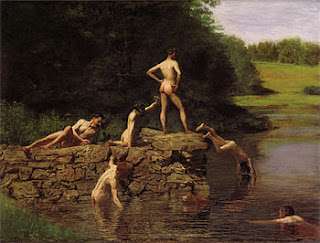D. H. Lawrence: Close-Up (Kiss), 1928
Cinema is the production of icons and the proliferation of moving images. From a biblical perspective, it is clearly sinful.
But if the authors of Exodus are primarily concerned with the making of graven images of God and the worship of pagan idols, there seems to be something else, something deeper, troubling them too; namely, a genuine concern with the very notion of representation as it relates to questions of reality, truth, and appearance.
We find the same concern amongst the ancient Greeks - Plato providing an obvious example. His insistence on presence and authenticity makes him suspicious of most art forms and his critique of writing as a pharmakon can easily be made also of film. Indeed, it's central to D. H. Lawrence's criticism of cinema: because the actors on-screen are not physically present before us, this invalidates both their performance and our response to it.
As a matter of fact, Lawrence says very little about the cinema, but when he does it's uniformly negative and hostile. In the poem 'When I Went to the Film', for example, Lawrence suggests that cinema is essentially - in its very form and function - an obscene and pornographic medium and that the content of the film is, therefore, in large part irrelevant.
This is because, for Lawrence, film sensationally stimulates false feeling and counterfeit emotion. It is both ideal and ecstatic; projecting shadows of people as if onto the wall of Plato's cave on the one hand, whilst provoking masturbatory thrills on the other. It is the art form par excellence of what he refers to as sex-in-the-head: i.e., a desire on the part of hyper-conscious, visually-fixated individuals to experience everything in their minds and to exchange the sheer physical intensity of life lived in the flesh for a new piece of knowledge and a bucket of popcorn.
Lawrence's concern is not that this results in a loss of soul, but in a denial of the body and corporeal reality: "The amazing move into abstraction on the part of the whole of humanity", he argues, "means we loathe the physical element ... We don't want to look at flesh-and-blood people ... We don't want to hear their actual voices" [1]. Rather, we wish only to interact with them mediated via technology.
In his novel of 1920, The Lost Girl, Lawrence privileges the dying art of the music hall over that of the newly emergent cinema, prioritizing live speech and presence over celluloid sensation. It's much the same argument as he makes in his poetry: film is cheap and easy and it costs the audience nothing apart from the price of a ticket: no feeling of the heart, no appreciation of the spirit is necessary - just wide open eyes and a desire to be titillated.
Whatever we might think of this critique - and it's far from convincing - there is no denying that our curiosity towards images is always erotically charged. Sex might not be the origin of the world as Courbet suggested, but it's certainly the origin of cinema and our insatiable will to knowledge. The faces of Greta Garbo and Rudolph Valentino "plunged audiences into the deepest ecstasy ... one literally lost oneself in the human image" [2].
This cinematic jouissance - brilliantly theorized by Patricia MacCormack [3] - is a major concern for some people. For others, what matters is the violence that is done to the real; i.e. the fact that the production of images results in the murder of objects, not that it causes audience to moan from close-up kisses and simulated sex. I'll say more about this in part two of this post.
Notes:
[1] D. H. Lawrence, 'Men Must Work and Women as Well', Late Essays and Articles, (CUP, 2004), p. 283.
[2] Roland Barthes, 'The Face of Garbo', Mythologies, trans. Annette Lavers, (Paladin Books, 1973), p. 62.
In his novel of 1920, The Lost Girl, Lawrence privileges the dying art of the music hall over that of the newly emergent cinema, prioritizing live speech and presence over celluloid sensation. It's much the same argument as he makes in his poetry: film is cheap and easy and it costs the audience nothing apart from the price of a ticket: no feeling of the heart, no appreciation of the spirit is necessary - just wide open eyes and a desire to be titillated.
Whatever we might think of this critique - and it's far from convincing - there is no denying that our curiosity towards images is always erotically charged. Sex might not be the origin of the world as Courbet suggested, but it's certainly the origin of cinema and our insatiable will to knowledge. The faces of Greta Garbo and Rudolph Valentino "plunged audiences into the deepest ecstasy ... one literally lost oneself in the human image" [2].
This cinematic jouissance - brilliantly theorized by Patricia MacCormack [3] - is a major concern for some people. For others, what matters is the violence that is done to the real; i.e. the fact that the production of images results in the murder of objects, not that it causes audience to moan from close-up kisses and simulated sex. I'll say more about this in part two of this post.
Notes:
[1] D. H. Lawrence, 'Men Must Work and Women as Well', Late Essays and Articles, (CUP, 2004), p. 283.
[2] Roland Barthes, 'The Face of Garbo', Mythologies, trans. Annette Lavers, (Paladin Books, 1973), p. 62.
[3] See Patricia MacCormack, Cinesexuality, (Ashgate Publishing Ltd., 2008).
























